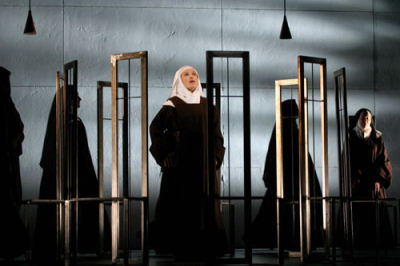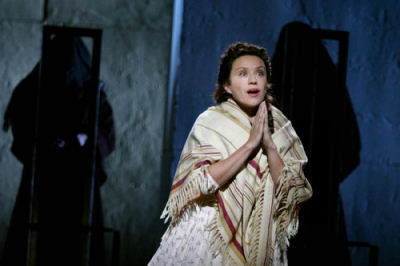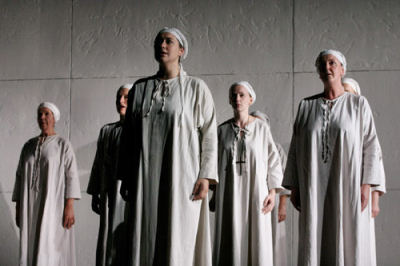Poulenc, The Carmelites:
Soloists, English National Opera, Paul Daniel, conductor,
Coliseum, 5.10.2005 (ED)
Blanche
Catrin Wyn-Davies
Marquis
de la Force
Ashley
Holland
Chevalier
de la Force
Peter
Wedd
Madame
de Croissy
Felicity
Palmer
Madame
Lidoine
Orla Boylan
Mother
Marie
Josephine
Barstow
Sister
Constance
Sarah
Tynan
Mother
Jeanne
Jane
Powell
Sister
Mathilde
Anne
Marie Gibbons
The
Chaplain
Ryland Davies
First
Commissioner
James
Edwards
Second
Commissioner
Roland
Wood
First
Officer
Toby
Stafford-Allen
Gaoler
David
Stephenson
Monsieur
Javelinot
William
Berger
Conductor
Paul
Daniel
Director
Phyllida
Lloyd
Designer
Anthony
Ward
Translation
Joseph
Machlis

For
a composer who saw nothing wrong in “using other people’s
chords” (as he put it) and a great many of whose works have
an outward frivolity, The Carmelites remains unsurpassed in its
inventiveness and ability to seamlessly fuse opposites. The
composer himself identified the key one: fear and transference
of grace, both of which the opera probes deeply in its sequence
of short scenes.
For
many, a plot that deals with the personal and religious issues
of facing forced execution under a revolutionary regime might
prove too much to take. Poulenc’s gift to Bernandos’ libretto
(originally intended as a cinematic outline) was almost paradoxically
to give it a lightness and space so the full impact gradually
accumulates throughout the evening. For this to successfully
come off in performance it needs sensitivity in terms of stage
direction and conducting. In Phyllida Lloyd’s and Paul Daniel’s contributions
this was never absent.

With simply textured mobile sets that aided the seamless
move from scene to scene and emphasized the simplicity of
the Carmelites world, Lloyd created a contrast to the episodes
of outward terror which otherwise might have appeared over-short
in duration. Daniel’s willingness to keep the dynamic sweep
alertly lithe left few points for the tension to sag even
slightly. His ear for sonority in the orchestration and attack
in the playing of it showed Poulenc
at his most serious. Just as crucial though was the recognition
that silence too caries an important role in the work, and
this was allowed to register dramatically.
For an opera that relies so heavily on its female cast
the need for a strong leading quartet (Blanche, Sister Constance,
Madame de Croissy and Mother
Marie) is inescapable. ENO fielded a uniformly strong quartet,
with each artist bringing out different aspects of their role.
Catrin Wyn-Davies’ Blanche plumbed the
depths of personal agony in a convincingly acted portrayal. Sarah
Tynan’s Constance
contrasted nicely by bringing a certain youthful impetuousness
and endearing warmth of tone. The self-confessed warmth that Poulenc felt for Constance’s character came through too in
the charming delivery of some of the scores most ravishing
music. The other Sisters were well taken, mostly by members
of the ENO Chorus. Their rousing singing of the Salve Regina
as one by one they approached the scaffolding was powerful
and highly touching.

Above
all though it is the contributions of Felicity Palmer and
Josephine Barstow that stick the longest
in the mind, and most particularly that of Palmer. Her Madame
de Croissy suggested so much with
the voice and inflection of the text as to render negligible
the imposed limitations on stage movement (chair-bound and
bed-ridden). With absolute strength and conviction the character
was in place. Barstow
demonstrated as much through her acting as her voice the sense
of duty that the Carmelites should follow even in direst adversity.
The
male roles though should not be completely overlooked. Ashley Holland’s Marquis suffered with the language slightly – for once
not a problem common to the production – though he sang with
decent tone. Peter Wedd’s Chevalier
was somewhat unvarying in tone, and in forte passages somewhat
harsh. The opposite was the case with Ryland
Davies’ keenly characterized Chaplain and David Stephenson’s
Gaoler delivered with apt authority the rulings of the Revolutionary
Tribunal that sealed the nuns’ fate.
Simplicity
and directness make this a production of great strength and
effectiveness that does both music and drama proud.
Fear is ever present and graphically portrayed at times,
but stronger still is the strength found in personal and religious
conviction that Bernandos and Poulenc
sought so passionately to convey.
Evan
Dickerson
All photographs
© Stephen Vaughan





